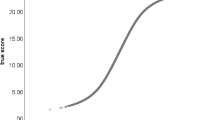Abstract
Previous empirical research suggests that problem discovery is an important step in the creative process. The present investigation was conducted to examine the role of problem discovery in the divergent thinking and creative performance of adolescents. Three divergent thinking tests were administered to a group of adolescents. Each test contained three presentedproblems and one discoveredproblem. The discovered problem allowed the adolescents to think of a problem and then to provide solutions. Comparisons indicated that the adolescents generated significantly more responses to the discovered problems than the presented problems. Most important was that the unique variance of the discovered problems (controlling the variance shared with scores from the presented problems) was reliable and significantly related to five indices of creative performance. These results support the componential theory of divergent thinking and creativity, and are consistent with the developmental view of problem finding.
Similar content being viewed by others
References
Albert, R. S., and Runco, M. A. (1986). The achievement of eminence: A model of exceptionally gifted boys and their families. In Sternberg, R. J., and Davidson, J. E. (eds.).Conceptions of Giftedness. Cambridge University Press, New York.
Anastasi, A. (1983).Psychological Testing, 5th ed. Macmillan, New York.
Arlin, P. K. (1975). Cognitive development in adulthood: A fifth stage?Develop. Psychol. 11: 602–606.
Bransford, J. D., and Stein, B. S. (1984).The Ideal Problem Solver. Freeman, New York.
Cohen, J., and Cohen, P. (1975).Applied Regression/Correlation Analysis for the Behavioral Sciences. Erlbaum, Hillsdale, NJ.
Csikszentmihalyi, M., and Getzels, J. W. (1970). Concern for discovery: An attitudinal component of creative production.J. Personal. 38: 91–105.
Csikszentmihalyi, M., and Getzels, J. W. (1971). Discovery-oriented behavior and the originality of creative products: A study with artists.J. Personal. and Social. Psychol. 19: 47–52.
Davidson, J. E., and Sternberg, R. J. (1984). The role of insight in intellectual giftedness.Gifted Child Quart. 28: 58–64.
Getzels, J. W. (1975). Problem-finding and the inventiveness of solutions.J. Creative Behav. 9: 12–18.
Hocevar, D. (1980). Intelligence, divergent thinking, and creativity.Intelligence 4: 25–40.
Moore, M. T. (1985). The relationship between the originality of essays and variables in the problem-discovery process: A study of creative and noncreative middle school students.Res. Teaching English 19: 84–95.
Owen, S. V., and Baum, S. M. (1985). The validity of the measurement of originality.Educat. Psychol. Meas. 45: 939–944.
Renzulli, J. S. (1978). What makes giftedness? Reexamining a definition.Phi Delta Kappan 60: 180–184.
Runco, M. A. (1984). Teachers' judgments of creativity and social validation of divergent thinking tests.Percept. Motor Skills 59: 711–717.
Runco, M. A. (1985). Reliability and convergent validity of ideational flexibility as a function of academic achievement.Percept. Motor Skills 61: 1075–1081.
Runco, M. A. (1986a). Maximal performance on divergent thinking tests by gifted, talented, and nongifted children.Psychol. Schools 23: 308–315.
Runco, M. A. (1986b). Divergent thinking and creative performance in gifted and nongifted children.Educat. Psychol. Meas. 46: 375–384.
Runco, M. A. (1986c). Flexibility and originality in children's divergent thinking.J. Psychol. 120: 345–352.
Runco, M. A. (1986d). The discriminant validity of gifted children's divergent thinking test scores.Gifted Child Quart. 30: 78–82.
Runco, M. A. (1987). The generality of creativity in gifted and nongifted children.Gifted Child Quart. 31: 121–125.
Wakefield, J. F. (1985). Towards creativity: Problem finding in a divergent-thinking exercise.Child Study J. 15: 265–270.
Wallach, M. A., and Kogan, N. (1965).Modes of Thinking in Young Children. Holt, Rinehart, & Winston, New York.
Wallach, M. A., and Wing, C. W., Jr. (1969).The Talented Student. Holt, Rinehart, & Winston, New York.
Author information
Authors and Affiliations
Additional information
Received Ph.D. in Cognitive Psychology from the Claremont Graduate School. Research interests include the psychometrics of creativity and giftedness, and the developmental antecedents of eminence and genius.
Current interests include gifted children and creativity.
Rights and permissions
About this article
Cite this article
Runco, M.A., Okuda, S.M. Problem discovery, divergent thinking, and the creative process. J Youth Adolescence 17, 211–220 (1988). https://doi.org/10.1007/BF01538162
Received:
Accepted:
Issue Date:
DOI: https://doi.org/10.1007/BF01538162




